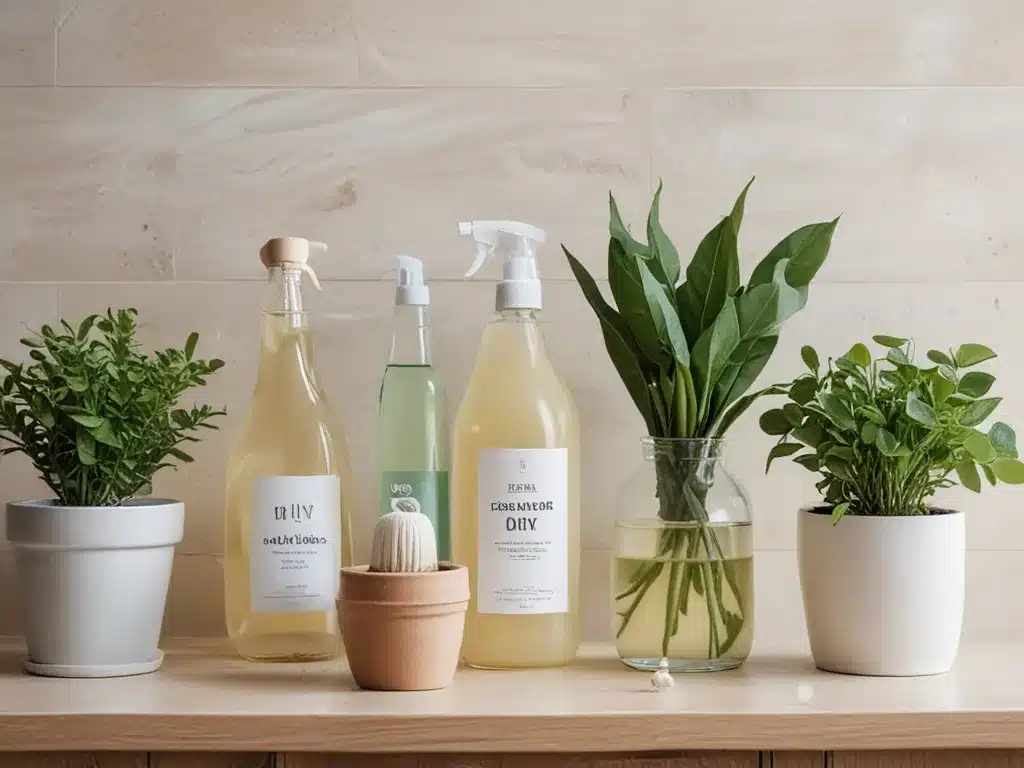Introduction
As I strive to live a more sustainable lifestyle, I have been exploring ways to make my own cleaners using natural, plant-based ingredients. Not only is this better for the environment, but it saves money and avoids exposure to the harmful chemicals found in many commercial cleaning products. Through research and trial-and-error, I have discovered some of the best plant-based ingredients to use in DIY cleaners. In this article, I will share my top picks and how to use them effectively.
Why Choose Plant-Based Ingredients?
There are several key benefits to using plant-based ingredients in DIY cleaners:
-
Sustainable: Plant-based ingredients are renewable and biodegradable. They avoid plastic waste from commercial cleaner bottles.
-
Non-Toxic: Most plants contain no or very few toxic chemicals. They are much safer for me, my family, and pets.
-
Affordable: Purchasing bulk plant ingredients is very affordable compared to buying commercial cleaners. I save a lot of money.
-
Effective: Many plants contain powerful antibacterial, anti-inflammatory, and antimicrobial properties that get surfaces clean.
-
Natural Fragrance: Essential oils from plants give my cleaners a fresh, natural scent without artificial fragrances.
Best Plant-Based Ingredients for DIY Cleaners
After much experimentation, these are my top recommended plant-based ingredients to use in DIY cleaners:
Vinegar
Vinegar is my go-to base for most DIY cleaners. I prefer using white vinegar since it is very affordable when purchased in bulk.
Vinegar is a powerful disinfectant and deodorizer. It works to cut through grease, soap scum, and mineral deposits. I use it for:
- All purpose cleaner
- Glass and window cleaner
- Hardwood floor cleaner
- Bathroom cleaner
- Kitchen cleaner
Be sure to test vinegar on surfaces first to check for discoloration. It can eat away at certain surfaces like natural stone. Dilute vinegar by mixing 1 part vinegar to 3 parts water.
Baking Soda
Baking soda is a versatile base for DIY scrubbing cleaners. It serves as a mild abrasive to lift dirt and stains.
Baking soda also neutralizes odors. It’s great for scrubbing:
- Bathroom surfaces
- Kitchen surfaces
- Countertops
- Appliances
- Outdoor furniture
I make a paste by mixing 3 parts baking soda to 1 part water. Sprinkle surfaces generously with baking soda and use a damp sponge or cloth to scrub.
Lemon Juice
Lemon juice works similarly to vinegar with its high acid content. It disinfects, deodorizes, bleaches, and cuts through grease.
I like using lemon juice for:
- Kitchen cleaners
- Bathroom cleaners
- Stainless steel and chrome polisher
Always test lemon juice on surfaces first before applying, as with vinegar. Mix 1 part lemon juice to 2 parts water.
Essential Oils
Essential oils not only provide natural fragrance to DIY cleaners, but many also have disinfectant qualities. My favorite essential oils to use are:
- Lemon oil: Antibacterial, cuts grease, and provides fresh scent
- Tea tree oil: Anti-fungal, anti-bacterial, anti-viral
- Peppermint oil: Energy boosting scent
- Lavender oil: Calming fragrance
Use 5-10 drops of essential oil per 1 cup of water or vinegar/lemon juice solution. Do not ingest essential oils.
Castile Soap
Castile soap is plant-based soap made from vegetable oils. It serves as an effective surfactant to help lift dirt and grease.
I like to use castile soap for:
- All purpose cleaners
- Greasy surface cleaners
- Laundry detergent
Dr. Bronner’s is a top brand of castile soap. Use approximately 1 tsp per 1 cup of water. Shake well before each use.
Hydrogen Peroxide
Hydrogen peroxide is an effective disinfectant and whitening agent. I use it for:
- Disinfecting bathrooms
- Whitening grout
- Whitening bathtubs
Be sure to test hydrogen peroxide on surfaces first. Dilute to 10% solution (1 part peroxide to 9 parts water) when using as disinfectant.
Microfiber Cloths
A key tool for DIY cleaners is microfiber cloths. The ultra-fine fibers are great at trapping and removing dirt, grease, and dust without chemicals.
I use microfiber cloths for:
- Dusting
- Cleaning glass, windows, mirrors
- Cleaning kitchen surfaces
- Cleaning bathroom surfaces
No additional cleaner is needed – just use a damp microfiber cloth to clean most areas.
Tips for Making DIY Cleaners
Here are some of my top tips for formulating effective DIY cleaners with plant-based ingredients:
- Always label each cleaner with ingredients and instructions
- Shake cleaners before each use to mix ingredients
- Store cleaners in clear spray bottles for easy access
- Wear gloves to protect skin from irritation
- Ventilate area well when mixing up cleaners
- Do allergy test on small patch of skin before using
- Test cleaners on inconspicuous surface area first
- Start with small batches to gauge efficacy
Conclusion
Creating my own DIY cleaners with plant-based ingredients has been a rewarding experience. Not only are they better for my health and environment, but they actually work really well at cleaning and disinfecting my home. Vinegar, baking soda, lemon juice, castile soap, essential oils, and microfiber cloths are some of the best ingredients to include. With proper precautions and tests, you can make effective plant-based cleaners suited to your unique needs. I encourage you to give DIY cleaners a try – you may be surprised by how well they work!







